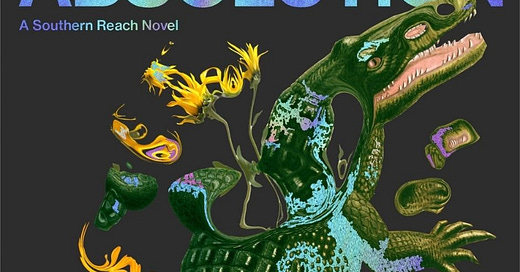I’m Zach, the writer of Realms.
If you like sci-fi and fantasy, Realms is the place for you!
Realms offers free and paid subscriptions. For free you’ll get short stories and reviews in your inbox!
If you want deeper dive analysis into the best of SFF, and podcast versions of these posts, try out a paid subscription for a week!
How Realms Reviews Works
Welcome to Realms Reviews! These are super short reviews on the best in sci-fi and fantasy. I’ll tell you my thoughts on books, film, and video games in SFF and whether it’s worth your time or not.
My rating system goes like this, from best to worst: Z, S, A, B, C, D.
Z means whatever I reviewed is the absolute best of its kind and will leave you wishing you had more.
S is for media that is excellent, but not quite earth shattering.
A is for very good. Something that is worth your time.
B is good. Just good.
C is best summed up as “Meh” - it will make no difference in your life and is probably worth skipping.
D is a definite no. Skip it. Avoid it.
Absolution by Jeff Vandermeer
I am a longtime fan of Vandermeer’s work. He wrote one of my favorite novels of all time, Finch. I have a relationship and perspective on his work that makes reading his new material interesting; it becomes a comparative experience, in a way.
Compared to his other novels, I found Absolution to be a bit of a tough read. On a spectrum from a James Patterson novel (easiest to read) to Fyodor Dostoevsky (hardest), it leans certainly more Dostoevsky. Or Virginia Woolf (one of Vandermeer’s inspirations). When I think about what literature, and more specifically, what science fiction can be as a storytelling technology, Absolution fits the bill. It’s abstract, weird, beautiful, cohesive, and compelling all at once.
I’m a bit of a soft reader, looking for books that match what I want and need and can give it to me quickly (I’m a Millennial, sue me.) For someone like me, reading Absolution was a chore, especially in Part I and III of the book. The middle part is much more “traditional” in terms of storytelling. The others tell their story via character-driven stream of consciousness, where events play out purely through the character’s perception. This is where Vandermeer’s mastery of the weird truly stands out. I felt, as I read, like I was emotionally fused with the character, like I could become them if I studied this work long enough.
Vandermeer’s novels and tropes wear their themes on their sleeves: secret agents, ecosystem deformities, mysteries within mysteries, characters versus fate, deep love. All of these elements exist in Absolution and are satisfying to interact with. But there was something missing for me. I must acknowledge that, as a longtime fan, I am both blessed and cursed by my fandom. Hummingbird Salamander had, for me, a stronger answer as to why the main character’s journey mattered to me as a reader. In Borne, the overall message of the novel (which I would say is this: human nature will consume everything unless we stop ourselves) was more clear. Finch wielded both of these elements: a personally powerful story and a satisfying, deeper message.
But these are just personal preferences, not objective statements. Absolution is not like these novels at all. It’s more of a hellish train ride in three different modes of storytelling. The ending is satisfying, and so is the journey. Perhaps it’s better to say Absolution is enjoyable, but not fun. It stretched my mind’s imagination.
Of course I’m compelled to compare Absolution to Vandermeer’s other novels, but I must also view it on its own. It is ambitious, maybe not his most ambitious, in terms of breaking his own patterns of writing theme-wise, but certainly in how this story is written. It’s one that must be finished to be truly appreciated. I can’t wait to read this again, or to dive in to my favorite sections, once my soul processes all the wild events that occurred.
My rating for Absolution is A: Amazing! Worth the read, but not everyone’s cup of tea.
Here’re some of my favorite quotes:
“Could you lose your mind to an unanswerable question, or just your soul?”
“He masticated words like if he didn’t they would come out the other end uncomfortably whole.”
“What was a person, sometimes, but a wandering fire. But put the flames out, and what was left?”
“Oh how miraculous and how deranged, the way the seagulls melted and re-formed, dropped out of the sky and into the sea like eggs cracked open into yolks, splooshing into the water.”
“Old Jim did not like the idea of the cameras mingling with the substrata, with the detritus at the bottom of the estuary. To be pulled apart over time, to molecule by molecule become part of the Forgotten Coast. Even if that was the fate of every living thing.”
What did you think of Absolution? Would you read it?
Books referenced:





